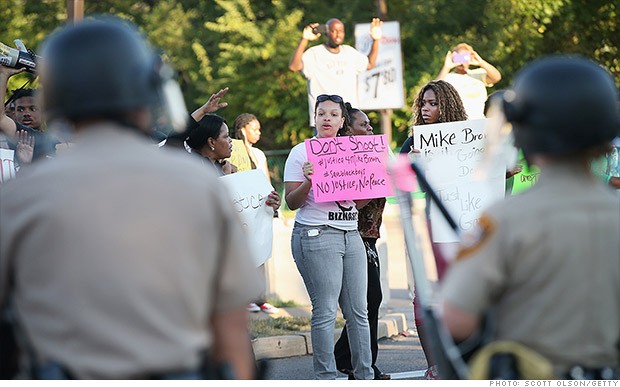 St. Louis Public Radio
St. Louis Public Radio
We are tempted to say there are no easy answers. Or is that too easy an answer? As we go to press, in the wake of a Missouri grand jury’s decision not to indict Officer Darren Wilson in the shooting death of Michael Brown, chaos has descended once more on Ferguson, the St. Louis suburb where the shooting of the unarmed black youth occurred in August. Even the first reports of arson, looting, and actual and potential violence made it clear that the reaction this time was more serious than the relatively controlled protests that occurred at the time of the shooting.
And perhaps more general. Even before the grand jury’s decision was known, there had been widespread apprehension in other places. Advance emergency preparations had been made by local governments everywhere, including Memphis and Shelby County.
There had been fears that the testimony and other proceedings of the grand jury would remain sealed — a circumstance that surely would have fueled the discontent. But the transcripts have been released, and the story they tell indicates that Officer Wilson underwent something less than relentless interrogation.
That won’t help assuage the sense of violation that is clearly felt, not only by the African-American population of Ferguson, nor will it allay the outrage of numerous other Americans, regardless of ethnicity, who suspect not only a miscarriage of justice, but, as a lawyer for the aggrieved Brown family said on Tuesday, that “this system is broken.” Meaning not just the system of American jurisprudence, but the very idea of fairness and equality in the nation at large.
Nor are such feelings confined to those who see Brown as the victim. Another whole slice of the nation is convinced that law enforcement itself is under siege, that Wilson was in the position of a scapegoat, that, at worst, he may have overreacted to extreme provocation in the course of doing his duty as a guardian of the peace. There is, after all, a surveillance clip of young Brown apparently bullying a diminutive Asian proprietor as he walks out of his store without paying for a clutch of cigars. Did he then, as Wilson apparently insisted, become threatening and grapple for the officer’s weapon when challenged to get out of the middle of the street?
Was Brown advancing on Wilson at the time he was shot? Or was he backing off with his hands up? The one thing we know is that Wilson shot to kill, and that action can never be undone.
Even had the grand jury process been truly thorough-going — and there is general agreement that it wasn’t — the actual truths of this matter might have remained obscure. They might indeed have been undiscernible. And that may be the real lesson of Ferguson, that there are circumstances that, by their very nature, do not permit complete answers.
But that does not obviate the need to establish conditions of justice. And, come what may, it cannot be said that justice had a complete chance to prevail in Ferguson, Missouri.